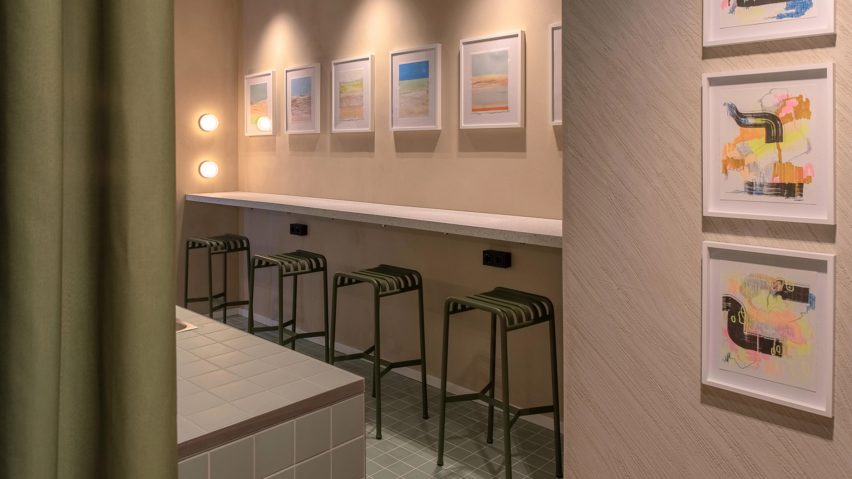Modular furniture, app-operated doors and a self-serve bar are among the experimental ideas being trialled at MM:NT, a mini-hotel in Berlin that will constantly evolve in response to feedback from guests.
Australian hotel group TFE Hotels worked with design strategist Philippa Wagner to develop the concept for a compact apartment hotel featuring interiors by architecture firms ACME and BWM that will operate in an ongoing beta mode.
The hotel operators describe MM:NT Berlin Lab as "a first of its kind mini-hotel laboratory, allowing guests to shape their own stay and actively change hospitality trends".
Occupying a renovated building in Berlin's Hackescher Markt, the hotel has six standalone bedrooms and several shared spaces including a lounge in the foyer and a kitchen with a self-pour bar, all of which guests can access without the need for on-site personnel.
Instead, guests use a concierge smartphone app to check in, check out and communicate with staff. The app also unlocks doors at the touch of a button and provides access to secure storage throughout the hotel.
ACME was the lead interior designer for the project, working on the communal areas and four of the bedrooms, while Austrian architecture office BWM designed room 00.02. The rooms range in size from 11 to 28 square metres and are intended to act as prototypes for use across future locations.
The remaining bedroom 00.03 was created by project partner and fittings manufacturer Häfele to showcase furniture and digital technologies aimed at personalising the guest experience and enhancing operational efficiency.
MM:NT's design sought to optimise the compact spaces and create the most convenient experience for guests, whether they choose to spend time in their rooms or the public areas.
In keeping with the hotel's focus on reducing resource consumption, these spaces are furnished with vintage items or products made with recycled materials.
ACME's design for the bedrooms aims to create a sense of a home away from home, using a palette of tactile materials to bring layered texture to the compact spaces.
"Calm, uncluttered spaces are essential to the MM:NT Berlin Lab experience," said studio director Friedrich Ludewig.
"Modular construction and using natural and recycled materials were essential to creating this. Compact rooms with smart storage solutions and built-in features to make the most of the available square metres."
ACME also designed the communal spaces at MM:NT Berlin Lab, which include a snug with an area for lockers containing additional amenities that help to reduce clutter in the rooms.
A multipurpose lounge space called The Counter allows guests to serve themselves coffee and sandwiches during the day, and drinks including locally sourced beers and wines in the evening.
A co-working area beside the bar features a bespoke table made by materials design and manufacturer Smile Plastics. The table is surrounded by chairs designed by Snøhetta and manufactured using recycled ocean plastic.
Guests at MM:NT can have groceries, laundry and meals delivered to secure lockers housed in an area called The Hub that can be controlled via the hotel's app.
The hotel offers three different room types, defined as Little, Middle and Big. The smallest rooms contain a double bed, shower room and modular storage, with the middle size adding a compact kitchenette.
The smallest room takes up just 11 square metres and was designed by ACME to feel cosy and uncluttered. The sleeping area is wrapped in wood panelling and features smart lighting that can be adjusted throughout the day.
Viennese studio BWM designed one of the Middle rooms, which features pull-out seating and foldable wall panels that enhance the adaptability of the 19-square-metre space.
The hotel's only Big room measures 28 square metres and is designed as a mini apartment, with a small kitchen and open-plan living and dining area. A fold-out bed provides space for an additional guest.
Materials that recur throughout the guest rooms include bamboo flooring, recycled tiles and birch veneer furniture. The bathrooms feature Durat sinks made from post-industrial plastic waste and Foresso worktops made using waste generated from furniture production.
MM:NT Berlin Lab launched with a two-month experiment where guests stayed for free and were asked to provide feedback on the hotel's rooms, services, atmosphere and ethos.
The hotel will begin taking bookings in summer 2024 but will continue to operate in "beta mode", with comments from guests helping to shape the spaces and service offering.
Founded in London in 2007, ACME's previous projects include a shopping centre wrapped in a latticed concrete facade and a modern family home that references a traditional Kentish oast house.

